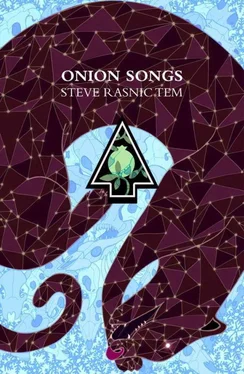Sometimes people would try to touch him and that was when a museum guard posted near the edge of the crowd warned them away. He had seen the guard there for days but had thought that the man was merely a part of the audience, perhaps out there on his lunch break and wondering why everyone was watching the man who was not there dancing behind a table full of garbage: water-stained photographs and papers so dirty and damaged no one could read them anymore. Of course this put additional weight on his verbal performance to convey exactly who his wife had been. But his voice was failing. Some days he could barely whisper. The crowd sometimes had to edge quite close in order to hear him. “Please do not touch the exhibit,” the guard would warn.
Sometimes he would notice the hands of certain audience members: opening and closing as if desperate to hold something. It occurred to him then that perhaps he should add things his wife had held to the table display: knitting needles, books, cooking implements. For didn’t the objects she had handled tell an important part of her story? He thought then of adding his own hands to the table display, or at least a casting or a photograph.
On some days if he kept at his performance long enough he became unaware of anything else. His figure became a tangle of moments, lines of force, electrical energy, exhalations, and perspirations. His very presence appeared to fracture the air.
Some days his body became a tired whisper in his ear, which he attempted to ignore. Some days he stood in the audience surrounded by vague figures and shadows of figures, an echo of imitated movements through time, and watched his own performance.
One day he arrived to find the exhibit closed. His table was there, but all his carefully collected documentation was missing. But then he couldn’t remember the last time he had seen those documents, and wondered if they might have vanished months ago.
“I’m afraid the exhibit is closed,” the guard said.
When he started to reply he realized the guard wasn’t talking to him, but to all the figures gathered behind him. They began to shuffle away, the outlines of their forms distorting and flowing across the landscape.
“What am I supposed to do now?” he asked. The guard did not answer. He began to dance, and could not find his arms, his legs, or his next wandering thought. But even then, his movement did not stop.
James Thurber once said there are two kinds of light: the glow that illuminates and the glare that obscures. I’ve always liked quotations. Whatever their content, they always seem apropos. If your audience doesn’t immediately grasp the connection, they’re inclined to think they just aren’t learned enough. I suppose they assume that if you’ve read enough to offer them some quotation, you must be smart enough to use it correctly.
I read a great deal. Unfortunately I’ve come to the conclusion that I understand very little of what I read. I can be thoroughly involved in a novel and still not know what it’s all about. One of the differences between novels and real life is supposedly that the novel has a theme. I believe that’s another quotation, but for the life of me I can’t remember the source, or enough of the original context to quote it more precisely. Some people say there are no original ideas. I sometimes wonder if I don’t remember the source, does that make it an original thought? Following that line of reasoning, the people with the poorest memories must be geniuses.
Perhaps you’ve had the experience of just starting to say something, but at the last second you become convinced it’s a quotation, and maybe you’re afraid you’ll make some embarrassing misquote, or maybe you’re afraid people will think you’re trying to pass off someone else’s thoughts as your own. So you say nothing. I think this may account for many awkward conversational silences. At least it does in my case. Some days I hardly say anything, so convinced I am that I understand nothing, and that every thought I have is stolen from someone else possessed of far better understanding than I.
About a month ago my wife and I brought a bad bunch of light bulbs into the house. I don’t mean that we acquired the bulbs as part of some joint purchasing decision—we just haven’t been able to pinpoint who bought this particular carton. Not that it matters that much—sometimes married couples just like to keep score. I’m sure that’s a quote; I’m sure I don’t remember who said it first.
We go through a lot of light bulbs in our house. It’s an old house utilizing a hodgepodge of wiring techniques, a regular electrical museum, which means surges and shorts, which seriously affect the lifespan of a bulb. What was it Dave Barry said about electricity? Something about how we believe it exists because the electric company sends us bills for it? We’ve tried the usual conservational measures—turning some of those light bulbs off, using fluorescent replacements—but we haven’t been all that successful at maintaining the changes. That’s probably more my fault than hers. I don’t think I have particularly lavish needs, but I do feel I deserve to walk around in as much light as possible, and not sit in the shadows worrying over what I might not see. “Let your light shine.” Oprah said that. And I love to read—we both do—a good reading light or two are essential in our house. Frankly, I don’t know how anyone can stand fluorescents. Is that real light? I hardly think so—it’s like moon glow bouncing off a snow bank. Kind of pretty, but strange and useless.
So we tend to buy cheaper bulbs, and lots of them. I know that’s probably not the most economical thing to do. But the more expensive bulbs seem to burn out almost as quickly in our house as the cheap ones, so what’s the difference? We’ve developed this pattern of buying large quantities, burning through them fiercely, buying more to feed that bright, illuminating fire that both comforts and exhausts us. Shakespeare said “We burn daylight.” I don’t know exactly what that means, but it still manages to chill me.
I knew there was something different about these bulbs the second I opened the box. Something about their color, when they’re cold, no electricity applied. Now, I’m used to the cheaper bulbs looking a little different. Maybe it’s illusory and they’re all pretty much the same, but to my eye they do look cheaper, just lying there, their insides less frosty, and a kind of shadow already inside, resting, as if their potential for light must be less. I actually wondered if perhaps we’d been tricked into buying previously used, burnt-out bulbs.
Then when I pulled one out I was surprised, shocked I suppose, by its heaviness. The sensation made me somewhat sick to my stomach. My wife and I have a peaceful life—we do not expect such things. “Expect nothing, live frugally on surprise,” to quote Alice Walker.
As I turned the bulb the heaviness shifted inside it. I didn’t think it contained liquid—no sensation of sloshing. But perhaps something solid, yet fluid. Sand maybe, but it felt too heavy for that. Moving it gently side to side, as if I were rocking it, brought eggs and their hidden embryos to mind, which made me feel both rude and foolish. That would not be a perception I’d share with my wife, who has long thought me a bit too much on the crude side.
Of course, Thomas Jefferson called politeness “artificial good humor,” and that’s not exactly positive, is it? Nothing artificial about my humor. The world is a funny old place. If you don’t laugh about it, you cry.
We never had children, but it wasn’t for lack of trying. I don’t know why we didn’t try the cures, or the alternatives. We never really talked about it. We left all that back in the shadows and just went on with our lives.
Читать дальше












